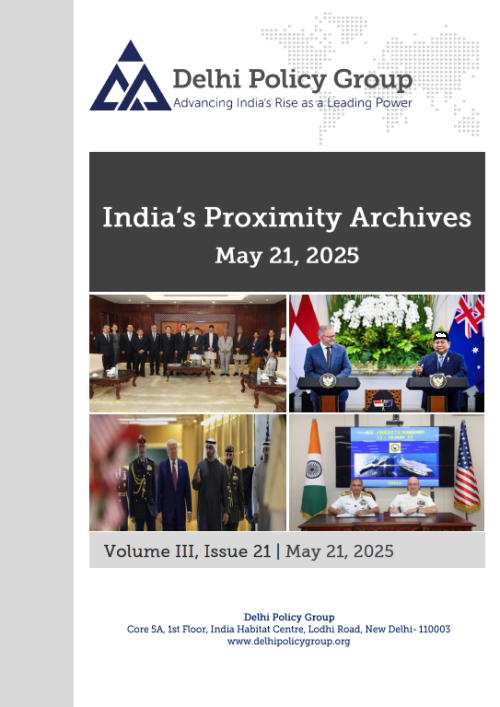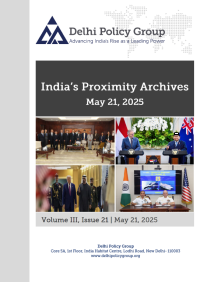India’s Proximity Archives
Date: May 21, 2025
South Asia
On May 15, India’s External Affairs Minister, Dr. S. Jaishankar, engaged in a telephonic discussion with the Taliban’s Acting Foreign Minister, Mawlawi Amir Khan Muttaqi. The clear condemnation of the Pahalgam terrorist attack by the Taliban administration in Afghanistan received appreciative acknowledgement from Dr. Jaishankar. The Pakistani military’s spokesperson previously alleged that India had conducted attacks on Afghan soil, a claim that Afghan and Indian officials unequivocally refuted. EAM Dr. Jaishankar, in this context, recognised Acting FM Muttaqi’s strong dismissal of efforts to generate distrust between India and Afghanistan by disseminating false and unsubstantiated information. Later, as a special measure, India authorised the entry of 160 Afghan trucks carrying dried fruits and nuts via the Attari border. The Taliban’s Ministry of Refugees and Repatriation issued a statement on May 20th, reporting that the Indian government had provided food aid to 5,000 Afghan individuals repatriated from Pakistan.
On May 15, India’s External Affairs Minister, Dr. S. Jaishankar, engaged in a telephonic discussion with the Taliban’s Acting Foreign Minister, Mawlawi Amir Khan Muttaqi. The clear condemnation of the Pahalgam terrorist attack by the Taliban administration in Afghanistan received appreciative acknowledgement from Dr. Jaishankar. The Pakistani military’s spokesperson previously alleged that India had conducted attacks on Afghan soil, a claim that Afghan and Indian officials unequivocally refuted. EAM Dr. Jaishankar, in this context, recognised Acting FM Muttaqi’s strong dismissal of efforts to generate distrust between India and Afghanistan by disseminating false and unsubstantiated information. Later, as a special measure, India authorised the entry of 160 Afghan trucks carrying dried fruits and nuts via the Attari border. The Taliban’s Ministry of Refugees and Repatriation issued a statement on May 20th, reporting that the Indian government had provided food aid to 5,000 Afghan individuals repatriated from Pakistan.
Southeast Asia
Making Jakarta his first overseas visit of his second term, newly re-elected Australian Prime Minister Anthony Albanese arrived in Indonesia on May 14 for a three-day visit. On May 15, the President of Indonesia, Prabowo Subianto, and the Prime Minister of Australia, Anthony Albanese, met for the Indonesia-Australia Annual Leaders’ Meeting. Following the meeting, a 2025 Annual Leaders’ Meeting Joint Communique was released. Major issues discussed included the Indo-Pacific, wherein the two leaders reaffirmed the importance of working together to promote an Indo-Pacific region that is peaceful, stable, prosperous and rules-based with ASEAN at its centre that upholds international law.
East Asia
On May 17, China’s state broadcaster CCTV reported that the construction of the Mohmand Hydropower Project in Pakistan has entered an accelerated phase. The state-owned China Energy Engineering Corporation, which holds the construction contract for the dam, has begun concrete filling at the site. Launched in September 2019, the project was originally scheduled for completion in 2026 but is now targeted for delivery in 2025. This development comes amid recent escalation between India and Pakistan following a deadly terrorist attack in Kashmir. India responded by suspending the 1960 Indus Waters Treaty, which governs water sharing between the two countries, along with other retaliatory measures.
West Asia
US President Donald Trump concluded his visit to the Middle East (Saudi Arabia, Qatar, and the UAE) on May 16. During the visit, the US deepened its partnership with Qatar with USD 1.2 trillion “economic exchange”; Saudi Arabia promised to invest USD 600 billion in the US; and a number of key projects were signed with the UAE, after its commitment to a ten-year, USD 1.4 trillion investment framework in the US. According to analysts, Gulf nations' engagement with President Trump demonstrates their desire to work with the US across business, defence, and high-technology sectors.
Central Asia
The Termez Dialogue on the Interconnectedness of Central and South Asia kicked off on May 20, under the motto “Building a Common Space of Peace, Friendship and Prosperity.” The high-level forum gathered approximately 200 participants from Central and South Asia, Europe, the Commonwealth of Independent States, Asia, the United States, and the Middle East. ‘Afghanistan’ was a major point of discussion during the dialogue. Speaking at the opening session, head of the United Nations Assistance Mission in Afghanistan (UNAMA), Roza Otunbayeva emphasised the importance of constructive regional engagement in addressing the challenges facing Afghanistan. “Efforts by neighbouring countries to resolve the Afghan crisis must be recognised and supported,” she stated.
Indian Ocean Region
The 8th meeting of the India-US Joint Working Group on Aircraft Carrier Technology Cooperation (JWGACTC) was held in India from May 13 to 16, marking a decade of collaborative engagement under the India–US Defence Technology and Trade Initiative (DTTI). Both sides acknowledged the significant progress made by the Joint Working Group in facilitating valuable information exchange on aircraft carrier technology. During the meeting, plans for future cooperation under various aspects of aircraft carrier technology were discussed. The six-member US delegation also visited Goa, where they engaged in professional interactions with the Indian Navy’s aviation specialists, focusing on operational and technical aspects of aircraft carriers. The JWGACTC, established in 2012, has played a pivotal role in co-developing and co-producing advanced defence technology, particularly in naval aviation.



